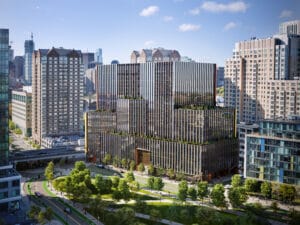
Greater Boston accounts for over half of all lab construction in the U.S. DivcoWest broke ground in June on a 375,000-square-foot office-lab building at Cambridge Crossing. Image courtesy of SteelBlue
Greater Boston has the strongest real estate outlook out of all non-Sunbelt metros in 2022, according to a new Urban Land Institute report that tracks economic prospects and investor sentiment.
Boston, Seattle and Los Angeles were the only coastal metros ranking among the top 20 for overall real estate prospects in this year’s report. New York and San Francisco ranked 42nd and 45th respectively.
Urban Land Institute’s “Emerging Trends in Real Estate” spotlights Greater Boston’s roaring life science industry as the main reason for its continuing demand among investors. Boston ranked 10th among all metros in 2022 real estate outlook and third in a survey of investor demand, trailing only Nashville and Austin, Texas. The report is based upon interviews and surveys of over 2,100 real estate industry executives.
Global gateway cities such as Boston, New York and San Francisco have seen steep upticks in office sublease space since early 2020, partially because of their concentrations of office jobs that can be performed remotely, the report noted.
But Greater Boston’s life science industry distinguishes it from other high-cost markets,. as the region accounted for more than half of the U.S. lab development pipeline at mid-year
The future of permanent hybrid or work-from-home models generated the most polarizing responses in the survey, according to ULI. Some executives were adamant that traditional office work is irreplaceable, while others predicted hybrid workplaces will become a permanent fixture.
“What share of workers ultimately will work remotely some or all the time will vary by location and type of job, but the answer will depend partly on the relative bargaining power of firms and their employees. With many industries unable to hire needed workers and the ratio of job openings to unemployed workers at historic highs, the scales are tipping in favor of labor,” the report said.
As office space demand declines, newer and high-end properties will benefit while older buildings will be eyed for conversions to other uses or redevelopment, ULI predicts.
The remote work trend also has affected residential markets, as employees no longer prioritize commute time and are willing to live further from downtown offices, ULI said. It’s also shifted demand for service businesses such as restaurants and dry cleaners from downtown business districts to suburbs closer to employees’ homes.




 |
| 



